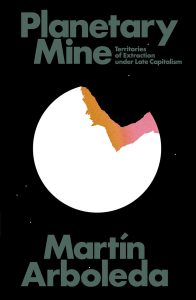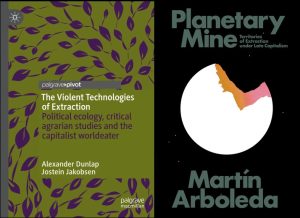Review Essay: Contesting total extractivism
THOMAS F. PURCELL
Within agrarian political economy, extractivism has emerged as a key concept to grapple with a whole host of politically urgent themes such as ecological destruction, global heating, accumulation by dispossession, depeasantization, land grabbing, and the financialization of nature—to name a few. This has led to the call to develop an “expanded conception of extractivism” that can offer up a theory of 21st century capitalism and tell us about more than injustices and ecological damage wrought in the physical sites of extraction or the pathologies of resource curses. The two books under review here address this call, albeit in diametrically opposite, methodological approaches. On the one hand, in Alexander Dunlap and Jostein Jakobsen’s book, we find a kind of green- anarchism where the rejection of materialism situates the theoretical terrain of the book somewhere between existentialism and romanticism; and on the other, in Martín Arboleda’s book, we find a value-theoretical Marxian critique that sees revolutionary potential in subaltern political agency.
The Capitalist Worldeater
 Aiming for a “broader and deeper” conceptualization of extractivism, Dunlap and Jakobsen’s argument draws widely upon critical agrarian studies and political ecology, while bringing these into dialogue with “dissident authors” and thought. The notion of Worldeater (Chapter 2) names the spirit and amalgamation of totalising violent technologies of the techno-capitalist world system propelling the global capitalist economy towards total extractivism. Drawing on “a mythological conception of the spirit and metaphysical form of capitalism” (p. 17), the world-system is seen as a “spirit infesting itself through mines, plantations, concrete, steel and fiber optic cables” (p. 20). The authors aim their critique at techno-industrial “progress” at the expense of a structural analysis of power and monopoly.
Aiming for a “broader and deeper” conceptualization of extractivism, Dunlap and Jakobsen’s argument draws widely upon critical agrarian studies and political ecology, while bringing these into dialogue with “dissident authors” and thought. The notion of Worldeater (Chapter 2) names the spirit and amalgamation of totalising violent technologies of the techno-capitalist world system propelling the global capitalist economy towards total extractivism. Drawing on “a mythological conception of the spirit and metaphysical form of capitalism” (p. 17), the world-system is seen as a “spirit infesting itself through mines, plantations, concrete, steel and fiber optic cables” (p. 20). The authors aim their critique at techno-industrial “progress” at the expense of a structural analysis of power and monopoly.
In the latter chapters 3-5, the authors chart land control, territorialization, and extraction as a trajectory of development within techno-capitalist progress (Worldeater(s)). They urge critical agrarian studies (CAS) and political ecology to embrace the radical anarchistic and pluriversal tendencies as a mode of meaningful political praxis, because as they highlight, the Marxian roots of both CAS and political ecology have diminished the anti-authoritarian and anarchist roots. In this respect, more potential is found in the “decentred” tradition of political ecology where post-structural anarchist influence is strongest and where direct action can take centre stage. Yet, this broad-brush refrain of diverse literatures as ‘too Marxist’ feels inadequate.
Chapter 4 provides an examination of the violent technologies of extraction necessary for social control and pacification. The disciplining of lands and peoples is explored through a discussion of “green” militarization that draws out the links with the political ecology of counterinsurgency as a state-led and endorsed repressive technique to dominate recalcitrant nature and peoples. Chapter 5 uncovers the links between conventional and green or renewable extractivism arguing that the latter have much more in common with the ecological degradation associated with the former. The authors’ argument leans on the idea of the “extractive peasant” to emphasize agency of, say, small- scale mining and entrepreneurial cooperative-led farming that, in turn, feeds the Worldeater. The chapter ends with a reflection on the potential agency and consciousness of those actors not fully subjugated to the commodity form and, therefore, “retains the ability of sabotage, ‘monkey wrenching’ and violently tinkering with the Worldeater’s machinery” (p. 111).
Chapter 6 offers an open solution to the problem of total liberation. Against positivism, materialism, and science more generally, the authors chart a path immersed in a politics of degrowth that can learn from indigenous groups practising subsistence and compatible with the horizontal political structures of bioregionalism. It is, however, hard to see how the anti-rationalist rejection of modernity and its institutions can, in any meaningful way, be compatible with cooperative and democratic politics beyond a romantic idyll of rural autarky.
Planetary Mine
 In contrast, Arboleda’s Planetary Mine follows the materialist tradition that sees abstractions as a product of a form of human social intercourse in which the abstract calculative practices of commodity exchange are generated under the historically specific conditions of the capitalist mode of production (see Sohn-Rethel, 1978). The planetary mine, it is argued, encompasses two world-historical transformations: a new geography of late industrialization that has upended the old spatial containers of core/periphery and global North/ global South and a wave of computerization and robotization, coined the fourth machine age.
In contrast, Arboleda’s Planetary Mine follows the materialist tradition that sees abstractions as a product of a form of human social intercourse in which the abstract calculative practices of commodity exchange are generated under the historically specific conditions of the capitalist mode of production (see Sohn-Rethel, 1978). The planetary mine, it is argued, encompasses two world-historical transformations: a new geography of late industrialization that has upended the old spatial containers of core/periphery and global North/ global South and a wave of computerization and robotization, coined the fourth machine age.
Writing against the grain of methodological nationalism, and the resurgent interest in dependency theory and imperialism, the book unfurls across three interrelated arguments. The first argument is pitched at the unitary whole of the industrial organism of extraction predicated on the production of relative surplus value at the world scale. The force of this argument is seen in the theory of “resource imperialism” that shows how we might think of a more uneven and dynamic world economy as the fabric or content of political processes that are national only in form. The argument that value is the kinetic force that drives the process of environment making in contemporary society shows how the underlying technical foundations of large-scale industry in general, and mining in particular, is driven forward by the tendency within the capitalist mode of production to increase the organic composition of capital. This is the material basis of the scientific-technological revolutions that has enabled the mine to become transnational infrastructure.
Second, by seeing capital as a genuinely global form of social mediation, we can keep sight of its national form, and violent neoliberal statecraft. Exploring the heterogeneous global geographies of labour articulated through mining supply chains, the Chilean Andes provides empirical illustration of how divisions of labour in mining towns play out across skill, location, and productive attributes. As a planetary condition, however, it is not possible to think of the global collective labourer without also linking the “degraded productive subjectivity of workers in a coltan mine or Foxconn assembly plant” to the “intellectual wage-earners at other points of the supply chain codifying knowledge to be incorporated in the former’s instruments of production” (p. 86).
Third, and at its most political, the book makes the case for a dialectical theory of praxis that can uncover the abstract and universal within the concrete and sensuous. Arboleda argues that a focus on forms or modes of existence of capital can also speak to the gendered and racialized geographies of labour that constitute opposite ends of the planetary mine and the social composition of the global working class. To do so, a decolonial theory of class is offered to make sense of the politics of large-scale mining and identifies a shift in the institutional geographical locus of class consciousness, that is, to territorial systems rather than the workplace and trade unions. This is as much an invocation of revolutionary pedagogy and practice as it is a lively and revitalizing work in the critique of political economy.
In the epilogue, returning to an argument at the heart of the book, Arboleda urges the reader to rethink “extraction beyond the mere spatiality of the mine and of the political territory of its national economy” (p. 244). Echoing the argument for total liberation in Dunlap and Jakobsen, Arboleda suggests that “as the boundary that divides manufacturing and extraction becomes increasingly tenuous, radical thought and action against extractivism should be redefined on the basis of total struggle against capital” (p. 253). While the spirit, rage, and humanism of this text are at times suggestive of a similar universal and abstract idealism, this is a resolutely materialist analysis and trenchant critique of the barbarity of the capital relation.
This is an abridged version of Thomas F. Purcell’s review essay, edited by Siddharth Chakravarty. It engages with two books that seek to make big theoretical contributions to our understanding of the socially and ecologically destructive dynamics of extractivism:
Planetary Mine: Territories of Extraction under Late Capitalism by Martín Arboleda, and
The Violent Technologies of Extraction: Political Ecology, Critical Agrarian Studies and the Capitalist Worldeater by Alexander Dunlap and Jostein Jakobsen.
Images from Verso Books and Palgrave MacMillan

